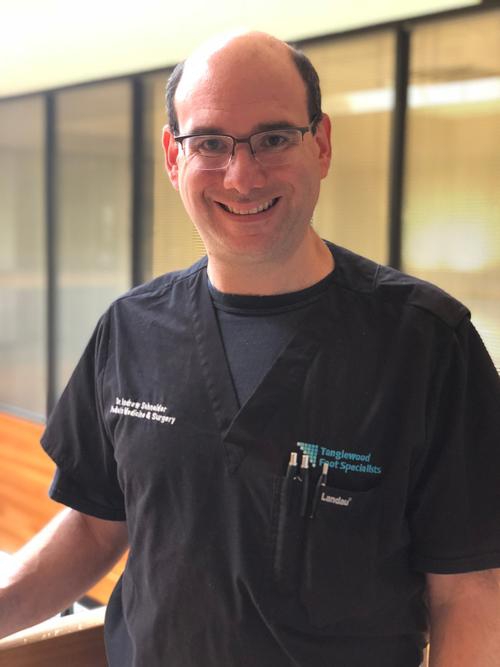 I always say that no one's feet should hurt. And this is doubly true when it comes to children. Hi, I'm Houston podiatrist, Dr. Andrew Schneider. And when your child tells you that they're starting to get heel pain, or if you see that they're limping, don't write it off. We very often write off children's foot pain as growing pains or that they jumped off of something, or we try to explain it away. But there's a condition called Severs disease, which affects children anywhere between nine and 14 years old, usually in more active children. But what it is, is a pain in the back of the heel. What an adult would experience as Achilles tendonitis is what a child will encounter Severs disease.
I always say that no one's feet should hurt. And this is doubly true when it comes to children. Hi, I'm Houston podiatrist, Dr. Andrew Schneider. And when your child tells you that they're starting to get heel pain, or if you see that they're limping, don't write it off. We very often write off children's foot pain as growing pains or that they jumped off of something, or we try to explain it away. But there's a condition called Severs disease, which affects children anywhere between nine and 14 years old, usually in more active children. But what it is, is a pain in the back of the heel. What an adult would experience as Achilles tendonitis is what a child will encounter Severs disease.
It's something called an apophysitis. It is where the Achilles tendon inserts into the growth plate in the back of the heel and causes it to become inflamed. And it is painful. It hurts with every step that your child takes. With the first step out of bed. And they take them out of sports and no one wants to be that one to tell your child that you just can't play, or even worse. Just give them Aleve before they play their game to have that pain, hopefully, at bay. But there are ways that we can take care of Severs disease.
First of all, it's not a disease. It's a mechanical condition that causes inflammation. It's called Severs disease because that's what they named it. There are stretches for Severs disease and it's similar to the structures that you would do for an Achilles tendon. You would stretch against the wall with the foot back that you need to stretch and lean forward. What you want to not do is hang your foot off of a curb or stair because what that's going to do is let gravity stretch you and you lose control of your stretches, and you can stretch too much.
There's also a brace that you can wear for Severs disease. It's a night splint or a stretching splint. And what you do is your child wears it when they sleep and it maintains the foot in a good position and helps to keep that Achilles tendon stretched to eliminate that inflammation and pain the following morning. And of course anti-inflammatories can play a role as well. Usually just over the counter anti-inflammatories for Ibuprofen or Aleve.
If we find that the mechanics are faulty or hypermobile, then I'll likely recommend some insoles or custom orthotics to help to stabilize the foot. By stabilizing the foot, it's going to limit the amount of the pull of the Achilles tendon and that's going to in turn, take the pressure off of the growth plate and reduce the inflammation. That's usually not the first line of treatment, but the long-term treatment. Once we get the pain under control, it will prevent it from coming back.
So if your child has been complaining about heel pain, it's time for you to get it checked. Give us a call at the office for an immediate appointment or visit our website and you can request an appointment there at www.tanglewoodfootspecialists.com. Thanks so much for watching and have a great day.

